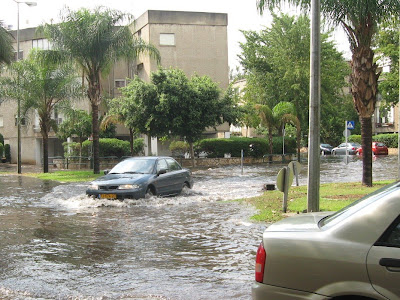Don't try these techniques when you are a Hyundai Getz going up against a semi-trailer.
"What??" you're saying, as you read the post title. Israelis don't signal while driving! After all, as I shared in my guide to driving like an Israeli, "Everyone Else on the Road is an Idiot," there's no point in sharing information like, say, the intention to shift lanes with drivers who are too stupid to understand.
But Israelis do have their own form of non-verbal communication while driving. To pass as an Israeli, master these techniques.
1. The Ex-Post-Facto Turn Signal.
Signaling before turning or making a lane shift would be giving away information (and might result in the person you're trying to cut off speeding up so you can't cut them off). But Israelis do know that signaling while changing lanes is mandatory. The simple solution? Signal after you change lanes. Barur.
2. The Nu-Pay-Attention Honk.
I come from a small, friendly American city in which someone at an intersection will only honk at you if you forget to turn left in front of them (cutting them off) after the light turns green. If people in my home town do honk in traffic, they're seriously upset-- blaring the horn is one step away from jumping out of your SUV and bashing in an offending driver's window with a baseball bat.
In Israel, on the other hand, honking (like shouting) is just another form of social interaction. Situations in which honking is expected include:
- Another driver seems to be pondering the idea of pulling out of a driveway or parking lot anywhere in the vicinity of your moving vehicle. Because they are idiots, you assume that they will pull into your car unless you honk.
- Another driver does not appear to have his feet poised above the gas pedal the moment the light flashes yellow (which happens before the light turns green here, in a little NASCAR "start yer engines" moment). If said driver hesitates for more than a millisecond or, G-d forbid, actually waits for the light to turn green, HONK.
- You see someone you know.
- You see people standing on a street corner holding signs.
- You feel happy and you know it.
If the driver in front of you is going too slowly (i.e., only 10 kilometers over the speed limit), you should flash your lights urgently into their rear view mirror until they pull over or shift lanes. (You, obviously, are in too much of a hurry to be bothered to lane shift.) My husband and I were recently driving along a country road in northern Israel and a car started flashing his brights at us from about 100 meters back. This is the most annoying behavior of the Israeli driver, and you have my permission to block this car in and drive as slowly as possible instead of pulling over.
By the way, something good to know: Israeli traffic police drive with their blue-and-white lights flashing. This does NOT mean that you need to pull over. They'll put on their siren if you do. On the other hand, if American traffic police drive behind you with their lights flashing, you DO need to pull over. My husband learned this the hard way when he came to the US in his teens. Luckily the cop liked Israel.
4. The How-You-Doin' Intersection Stare.
Ok, this is one of those things I'll never really feel comfortable doing, but apparently when Israelis stop at a traffic light, it's considered polite behavior to turn and stare at the people in the car next to you. I learned this when I watched an Israeli morning show segment about body language b'chul (abroad), and the Israeli host was shocked to learn that in certain parts of the world complete strangers will get mad if you scrutinize them while waiting for the light to turn yellow, er, green.
5. The Tut-Tut-Tut Finger Shake.
The driving version of the Instructional Finger (which I discussed in my guide to Israeli body language), this is the gesture you make when someone does something foolish or misguided (like attempting to cut you off) while driving. Like a wise grandmother from a children's story, put a pained expression on your face and shake your finger sadly at the offending driver. Alternately, raise your hand in the air with your palm towards your face. Both of these are more effective than actually, say, giving another driver the finger, because these gestures indicate an extra level of parental disappointment at another driver's failings. And we all know how effective Jewish Guilt can be.
6. The No-Really-I'm-Cutting-You-Off Nose Nudge.
This maneuver (familiar to anyone who has attempted to drive in New York City) indicates your seriousness about actually cutting off the driver in the next lane. If you nudge the front end of your car into the other driver's lane, some of the time he'll brake to let you in. Most the time he'll swerve around you. Once I saw this result in the Slowest Accident Ever: we were driving in rush-hour traffic through Kiryat Ata when a Hareidi guy tried to nose-nudge his way in front of a young female soldier, who wasn't having any of it. She nose-nudged him back, blaring on her horn. Over the next ten minutes, they each jerked forward inch by inch, screaming at each other (and not the friendly kind of Israeli yelling), until finally-- at about the speed of a dandelion growing in a nature documentary-- they collided into each other and dented their cars. Am I a bad person if that made my day?
Then, of course, there's the art of communicating on a cell phone while driving like an Israeli, but I'll save that for another day. (Here's a sneak preview: it involves lots of hand gesturing.)
Anything you would add to this list?


















